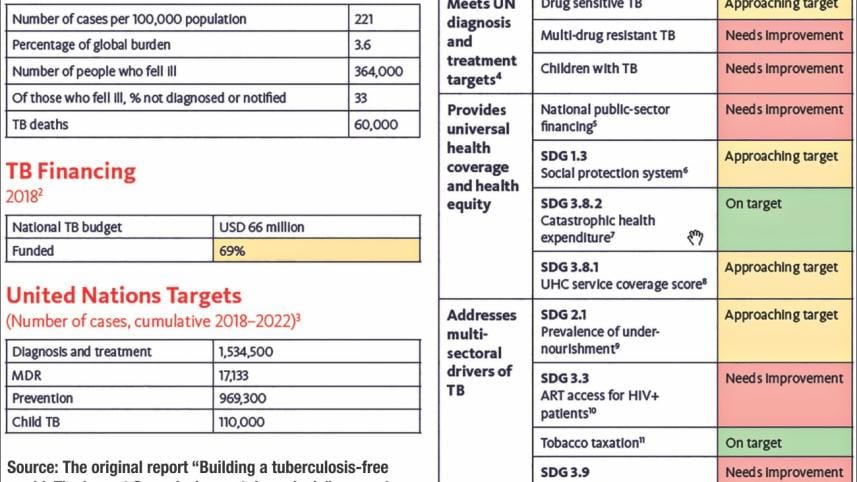Challenging TB in Bangladesh

Each year, we commemorate World Tuberculosis (TB) Day on March 24 to raise public awareness about the devastating health, social and economic consequences of TB, and to step up efforts to end the global TB epidemic.
TB remains the world's deadliest infectious killer. Each day, nearly 4,500 people lose their lives to TB and close to 30,000 people fall ill with this preventable and curable disease. Global efforts to combat TB have saved an estimated 54 million lives since the year 2000 and reduced the TB mortality rate by 42%.
The theme of World TB Day 2019 — 'It's time' — puts the accent on the urgency to act on the commitments made by global leaders to:
♦ Scale up access to prevention and treatment
♦ Promote equitable, rights-based and people-centred TB response
♦ Ensure sufficient and sustainable financing including for research
♦ Promote an end to stigma and discrimination
♦ Build accountability
Bangladesh scenario:
There is a huge TB burden in Bangladesh. In Bangladesh the numbers of the incidence of TB in the population is not going down dramatically. That means we have a long way to go to combat the disease. Moreover, the burden of drug resistant TB is on the rise.
The burden in the urban area and some pocket areas in the country is an added threat. On top of this, the prevalence of TB patients in some particular population like children, healthcare providers, HIV/AIDS patients are very difficult to handle.
Whereas the government is trying to extend support to the patient pool, there are obvious resource constraint that hinders the pathway to curve down the number of patients with a very short period of time.
Although the donor communities are supporting the government to mitigate the problem, there are ample opportunities to deal with TB burden.
Dr Abu Jamil Faisel, a Senior Technical Director of 'Challenge TB' project funded by USAID, expressed his optimistic view of combating the disease. But again, considering the constraints at different avenues, the fight is not likely to be short-lived.
In an interview with the Star Health, he highlighted some dire need of improvement in the holistic efforts to end TB. Like many other development initiatives, the lack of coordination with different government mechanisms and bodies are very crucial.
Recently, the report "Building a tuberculosis-free world: The Lancet Commission on tuberculosis" published the country report cards. It clearly revealed the room for paying immediate attention including the political will.
It is a matter of hope that the Government of Bangladesh is already committed to lower the disease burden. But it just needs a boost and some additional robust emphasis form the top level of country leadership.
Global initiative:
WHO has launched a joint initiative "Find. Treat. All. #EndTB" with the Global Fund and Stop TB Partnership, with the aim of accelerating the TB response and ensuring access to care, in line with WHO's overall drive towards Universal Health Coverage.
On this World TB Day, WHO calls on governments, affected communities, civil society organisations, health-care providers, and national/international partners to unite forces under the banner "Find. Treat. All. #EndTB" to ensure no one is left behind.
It is time for action! It is time to End TB. It is time to bring tuberculosis out of the shadows.
The interview of Dr Abu Jamil Faisel is available on YouTube at https://youtu.be/rxmnUlD-mmw or simply scan the QR code.




 For all latest news, follow The Daily Star's Google News channel.
For all latest news, follow The Daily Star's Google News channel.
Comments